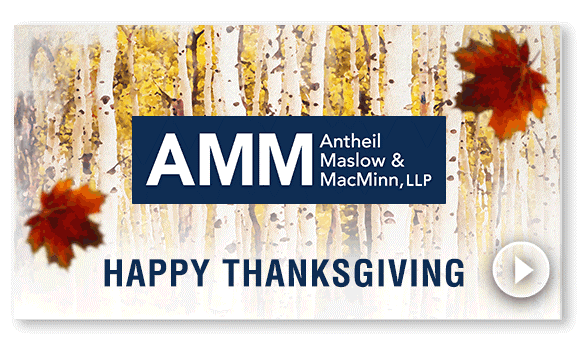Antheil Maslow & MacMinn, LLP partner Susan Maslow will moderate a panel CLE discussion: Model Contract Clauses in International Supply Contracts to Protect U.N. Acknowledged Human Rights: Review And Critique Of Version 2.O , Tuesday, April 20, 2021 during the American Bar Association (ABA) Business Law Section’s Virtual Spring Meeting.
Ms. Maslow is Vice Chair of the ABA Working Group formed to draft human rights protections in international supply contracts. The group’s 2021 Report and Model Contract Clauses, Version 2.0 (MCCs 2.0) are now finalized and can be found on the ABA Center for Human Rights site. The MCCs 2.0 are one of several initiatives within the Business Law Section’s implementation of the ABA Model Principles on Labor Trafficking and Child Labor. The Model Contract Clauses will be thoroughly discussed at the CLE.
For over 30 years, Ms. Maslow has concentrated her practice primarily in general corporate transactional work and finance documentation in the areas of Business Transactions, Business Law, Private Finance, Real Estate, Contracts, and Non-Profit Law. She has enjoyed assisting entrepreneurial individuals and privately-held companies in their efforts to structure and implement a great variety of business transactions, including stock and asset acquisitions, banking negotiations, mergers, secured and unsecured financing, real estate and business acquisitions and leases, capital arrangements for hospitals and other health care providers, distributorships, software services and license arrangements and business separations and dissolutions. She received her law degree from Temple University cum laude in 1983 after graduating from Rutgers University (B.A. 1978). She is a member of the Pennsylvania and New Jersey Bar Associations.
Ms. Maslow can be reached at smaslow@ammlaw.com or 215.230.7500 ext. 119.
Balancing Buyer and Supplier Responsibilites in International Supply Chains
Written by Susan MaslowModel Contract Clauses to Protect Workers in International Supply Chains, Version 2.0
A working group formed under the American Bar Association (ABA) Business Law Section has announced a revised set of model contract clauses for international supply chains. The 2021 Report and Model Contract Clauses, Version 2.0 (MCCs 2.0) from the Working Group to Draft Human Rights Protections in International Supply Contracts are now finalized and can be found on the ABA Center for Human Rights site. The MCCs 2.0 are one of several initiatives within the Business Law Section’s implementation of the ABA Model Principles on Labor Trafficking and Child Labor. The MCCs 2.0 are offered as a practical, contractual tool to assist inside and outside corporate counsel in efforts to reflect their clients’ commitment to stated human rights policies and desire to abide by international human rights soft and evolving hard law. Given the likely European Union and United Kingdom implementation of mandatory human rights due diligence, the mounting number of Withhold Release Orders in US ports, and growing investor concern with respect to environmental, social and governance (ESG) liability, the Model Contract Clauses should be of interest to all companies with complex supply chains and those that provide such companies legal services. Designed as a modular, practical tool for corporate counsel, the 2021 MCCs 2.0 are the first model contract clauses to implement “human rights due diligence” obligations in supply contracts. They attempt to integrate the principles contained in the UN Guiding Principles on Business and Human Rights (the “UNGPs”) and the OECD Due Diligence Guidance for Responsible Business Conduct into international contracts. The MCCs translate these principles into contractual obligations that require buyer and supplier to cooperate in protecting human rights and make both parties responsible for the human rights impact of their business relationship.
The Third Circuit Addresses Employment Discrimination Cases
Written by Patricia Collins
Reprinted with permission from the February 22nd edition of The Legal Intelligencer. (c) 2021 ALM Media Properties. Further duplication without permission is prohibited.
In Martinez v. UPMC Susquehanna, the United States Court of Appeals for the Third Circuit clarified the specificity required in pleading prima facie cases of discrimination in light of the holdings in Ashcroft v. Iqbal, 556 U.S. 662 (2009) and Bell Atlantic Corp. v. Twombly, 550 U.S. 544 (2007). The Third Circuit held that an age discrimination plaintiff need not plead the exact age or duties of the plaintiff’s alleged replacement in order to survive a motion to dismiss.
The plaintiff in the Martinez case appealed an order issued by the United States District Court for the Middle District of Pennsylvania dismissing the case for failure to state a claim under Iqbal and Twombly. The defendant, UPMC Susquehanna, employed the plaintiff, Dr. Martinez, as an orthopedic surgeon. Dr Martinez alleged in his complaint that UPMC Susquehanna terminated his employment and advised him that it was “moving in a different direction and his services were no longer needed.” UPMC Susquehanna also told Dr. Martinez that his termination had “nothing to do with his performance.” Dr. Martinez pleaded that he was seventy (70) years old, and that UPMC Susquehanna hired two doctors after his termination. The Complaint alleged that one of the hired physicians took over some of Dr. Martinez’s job duties, and that the second doctor was hired in response to a job posting for an orthopedic surgeon. Relevant to the Court’s analysis, Dr. Martinez alleged that both doctors were “significantly younger”, “less qualified,” and “less experienced” than Dr. Martinez.
Antheil Maslow & MacMinn, is pleased to announce the addition of Jennifer Dickerson to the firm’s growing Family Law practice group. Ms. Dickerson practices exclusively in the area of family law, handling a variety of issues, including divorce, child support, alimony/spousal support, equitable distribution and child custody matters.
Prior to joining the firm, Jennifer worked as a staff attorney with Bucks County Domestic Relations Office, after three years as Judicial Law Clerk to the Honorable Judge Alan M. Rubenstein in the Family Law Division of Bucks County Court of Common Pleas.
2021 Decennial Report Requirements for Pennsylvania Entities
Written by Stephanie M. ShortallIn 2021, entities formed in Pennsylvania and entities formed in other states that have registered to do business in Pennsylvania must file a Decennial Report with the Department of State. This requirement applies to business corporations, non-profit corporations, limited liability companies, limited partnerships, and limited liability partnerships. If a report is not filed, the entity will no longer have exclusive use of its company name or trade name and the name will become available for others to use it. While an entity can file after the December 31, 2021 deadline, a third party registering with the name during the gap period will have rights to the name, and the original entity will not be permitted to reinstate its exclusive rights to the name.
Earlier this year, the Department of State mailed notices to the registered address for each entity regarding its name, however, you should not rely on receiving such a notice to determine whether or not you have to file. All entities are required to file unless they made new or amended filings between January 1, 2012 and December 31, 2021.
The required forms can be found on the Department of State website at https://www.dos.pa.gov/BusinessCharities/Business/Resources/Pages/Decennial-Filing.aspx. There is a filing fee of $70, and the filing deadline is December 31, 2021.
If you are not sure whether you need to file this report for your entity, or if you have any questions regarding this requirement, feel free to contact us. We caution you not to rely upon the Pennsylvania Department of State’s website search feature to tell you whether or not your entity is required to file the decennial report.
Associate
215-230-7500, ext. 123
jdickerson@ammlaw.com
Practice Groups
Education
- Widener University, Delaware Law School, J.D. 2017
- Holy Family University, B.S. in Psychology, 2013
Bar Admissions
- Pennsylvania
On January 7th, the Treasury Department announced that the Paycheck Protection Program, a unique program that kept many businesses afloat during the initial months of the pandemic, will re-open the week of January 11 for a second round of loans for new borrowers and certain existing PPP borrowers. To promote access to capital, initially only community financial institutions will be able to make First Draw PPP Loans beginning on Monday, January 11, and Second Draw PPP Loans on Wednesday, January 13. The PPP will open to all participating lenders shortly thereafter.The PPP fund provides forgivable loans to businesses, providing they maintain their payroll.
Elizabeth J. Fineman, a Partner of the Bucks County law firm of Antheil Maslow & MacMinn, LLP, received a Special Achievement Award from the Pennsylvania Bar Association at a virtual luncheon on Thursday, November 19th. The award recognizes Ms. Fineman for stepping up to fill a co-editor position of the PBA Family Law Section Pennsylvania Family Lawyer newsletter, one of the association’s largest section publications. Fineman practices exclusively in domestic relations matters and handles a variety of issues, including divorce, child support, alimony/spousal support, marital taxation, equitable distribution and child custody matters. She has handled many high-income support cases involving an intricate knowledge of both family law and complex financial issues.
Holiday Custody Planning: The Time is Now
Written by Elizabeth J. FinemanWhile it is not yet Halloween, it is already time to starting thinking about your winter holiday custody schedule. Thanksgiving is only about a month away followed in December by Hanukkah, Christmas and Kwanzaa. Now is the time to take out your Custody Order to determine what the schedule is for this year. If you do not have a Custody Order or agreement, now is the time to start having a discussion with your child’s other parent to determine a holiday custody schedule. If you cannot resolve any disputes, now is the time to have the discussions and if necessary, file to have the courts assist in making a decision. If you wait until the eve of the holiday, it may very well be too late.
In addition to the actual schedule, now is also the time to start having discussions as to whether there will be any travel involved and who else will be at any holiday celebrations. While these may not be issues in most years, travel and who is at the holiday celebrations may very well be at issue in the age of COVID. These issues, along with the actual custody schedule, should be worked out well in advance of the holiday.
Finalizing the holiday custody schedule now will allow you all to have a much more enjoyable and less stressful holiday season.









